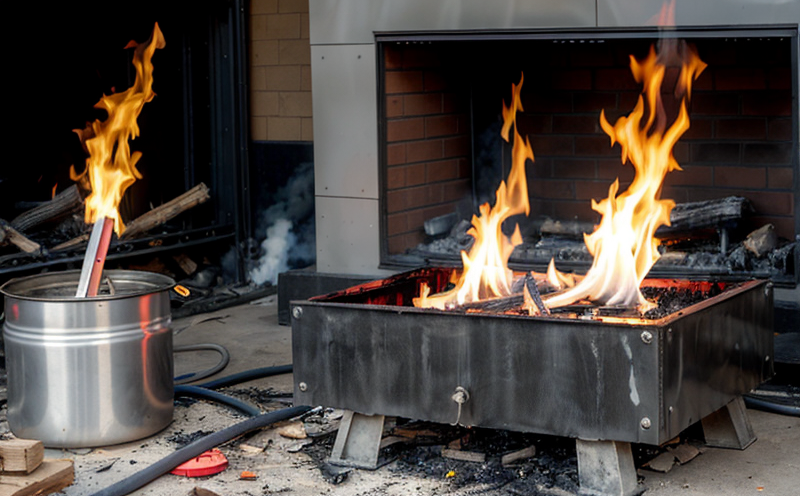EN 1364 Fire Resistance Testing for Non Loadbearing Walls
The EN 1364 fire resistance test is a critical procedure used to evaluate the performance of non-loadbearing walls in resisting fire. This standard ensures that these walls meet stringent requirements set forth by European Union directives, thereby enhancing safety and compliance.
Non-loadbearing walls play an essential role in buildings by providing separation between different spaces while not bearing structural loads. Their primary function is to prevent the spread of fire from one area to another within a structure. The EN 1364 test evaluates how effectively these walls can withstand exposure to high temperatures and flames without compromising their integrity.
The testing process involves subjecting specimens cut from non-loadbearing walls to controlled burning conditions in accordance with the specified procedures outlined in the standard. Specimens are typically exposed to a fire for a duration of 30 minutes or longer, depending on the intended use of the wall. Afterward, the integrity and structural stability of the specimen are assessed based on predefined criteria.
Understanding the specific requirements of EN 1364 is crucial for quality managers, compliance officers, R&D engineers, and procurement teams who work in the electronics sector. By ensuring that non-loadbearing walls meet the necessary standards, these professionals contribute to safer building designs and comply with regulatory expectations.
Key Parameters
- Specimen Dimensions: Specimens are usually cut from actual wall sections to simulate real-world conditions. The dimensions vary based on the intended application of the wall.
- Fuel Load: A defined fuel load is placed around the specimen to simulate a real fire scenario.
- Fire Exposure Time: Specimens are exposed to flames for up to 60 minutes, depending on the specified standard and application of the wall.
Instrumentation
The testing apparatus includes a furnace that can generate controlled fire conditions. Temperature sensors, flame detectors, and other monitoring devices ensure precise control over environmental parameters during the test. These instruments provide real-time data on heat exposure levels, which are critical for accurate assessment.
Why Choose This Test
- Compliance: Ensures strict adherence to European Union directives, enhancing legal compliance and reducing potential risks.
- Quality Assurance: Provides a standardized method for assessing the fire resistance of non-loadbearing walls, ensuring consistent quality across different projects.
The EN 1364 test is particularly valuable in electronics manufacturing where safety and compliance are paramount. By conducting this test, manufacturers can demonstrate their commitment to producing safe products that meet international standards. This not only protects end-users but also enhances brand reputation and market trust.
For R&D engineers, the EN 1364 fire resistance test offers valuable insights into material behavior under extreme conditions. These data points are instrumental in refining product designs and improving overall performance. In procurement processes, ensuring suppliers meet this standard ensures consistent quality across all components used in manufacturing.
Quality and Reliability Assurance
The EN 1364 fire resistance test is a cornerstone of quality assurance programs. It provides objective, repeatable results that can be used to verify the performance of non-loadbearing walls across various applications. This testing ensures that these walls maintain their structural integrity and continue to perform effectively under challenging fire conditions.
By incorporating this test into their quality control processes, companies can enhance the reliability of their products and services. This not only builds customer confidence but also contributes to long-term brand loyalty. Compliance with EN 1364 is particularly important for organizations operating in the electronics sector where safety and regulatory compliance are critical.
The test results serve as a benchmark against which future developments can be measured, ensuring ongoing improvements in product performance and reliability. This continuous improvement cycle enhances overall competitiveness and market reputation.
Competitive Advantage and Market Impact
- Innovation: The test drives innovation by encouraging continuous improvement in material science and design.
- Market Access: Compliance with EN 1364 opens up opportunities for international markets, particularly within the European Union.
The ability to pass the EN 1364 fire resistance test provides a significant competitive advantage in the electronics sector. It demonstrates a company's commitment to quality and safety, which can translate into increased market share and customer trust. In an increasingly globalized market, meeting regulatory standards like EN 1364 is essential for gaining access to international markets.
For R&D teams, this test fosters innovation by pushing the boundaries of what materials and designs can achieve under extreme conditions. By setting high standards early in the development process, companies can stay ahead of competitors who may not prioritize such rigorous testing.
The market impact of passing this test is substantial. It enhances a company's reputation and credibility, making it easier to secure contracts and expand operations. For procurement teams, ensuring suppliers meet these stringent requirements ensures consistent quality across the supply chain, leading to more reliable end products.





